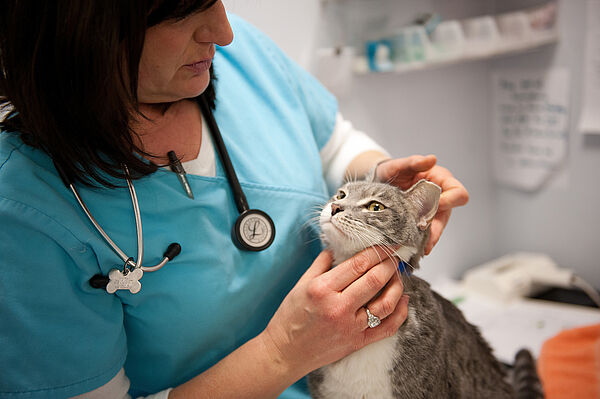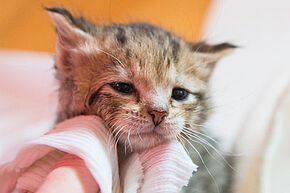Signs of Medical Emergency
If your cat is exhibiting any of these symptoms, he needs immediate medical attention:
- Difficulty breathing
- Major trauma (fall, hit-by-car, large wound, broken bone)
- Penetrating wounds
- Seizure activity
- Staggering, stumbling, head-tilted, sudden blindness
- Lameness or nonweight bearing on any limb
- Ingestion of poison or foreign material
- Inflammation, swelling or other irritation to the eye(s)
- Severe hives or itching
- Bleeding that does not stop
- Bloated, distended, swollen or painful abdomen
- Inability to urinate or defecate or frequent visits to the litter box
- Inability to deliver kittens
- Loss of balance or consciousness
- Rapid heartbeat
- Dilated pupils
- Vomiting or diarrhea with blood or violent episodes
In Case of Emergency
If you suspect that your cat has been injured or poisoned, contact your veterinarian immediately.
For quick reference, place the following emergency numbers in an easily visible and accessible place:
- Regular Veterinarian: Include your vet's name, number and address. If you are going out of town, call beforehand to authorize treatment and payment should something happen while you’re away.
- Emergency Veterinarian Include the name, number and address of the closest 24-hour emergency vet.
- Poison Control: The ASPCA Poison Control Hotline can be reached at 888-426-4435.
- Emergency Contact:Include the name and phone number of a person who can be called if something happens to you.
- Medical Information: Include a list of critical medications, allergies and other essential medical information about your cat.
Signs of Medical Concern
These signs should trigger a call to your vet:
- Continual diarrhea
- Continual vomiting
- Open mouth breathing, difficulty breathing or increased effort to breathe
- Bleeding that will not stop
- Unexplained bruising in the skin
- Not eating or drinking
- Lethargy an unexplained reduced level of activity or play
- Lack of interest in grooming
- Loss of color in gums
- Excessive drooling
- Excessive head shaking or scratching
- Excessive stretching or inability to get comfortable
- Change in odor from mouth, skin, feces or urine
- Loss of elasticity in fur
- Straining in their litter box


